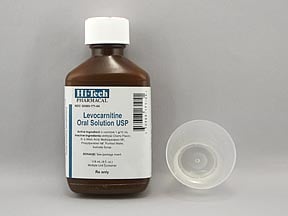
Carnitor Sf Coupons & Savings Card – Discount Prices from $15.89
Brand for: Levocarnitine
My prescription
Edit
118ML of 1GM/10ML, Levocarnitine (1 Bottle)
Select pharmacy

CVS
$32.97
COUPON PRICE
Walgreens
$15.89
COUPON PRICE
Walmart
$22.68
COUPON PRICE
Albertsons
$23.03
COUPON PRICECarnitor Sf savings card
Show this card to your pharmacist
Walgreens
$15.89
BIN
ID
PCN
GRP
011867
LHFBA344CC
HT
LABH001
Powered by
More prescriptions for carnitine deficiency
More prescriptions for carnitine deficiency
Price history for Carnitor Sf (brand) & Levocarnitine (generic)
1 Bottle, 10ML
Average retail price for Carnitor Sf
Average retail price for Levocarnitine
Average SaveHealth price for Levocarnitine
Our price history data is based on aggregated prescription data collected from participating pharmacies in America. Our prescription data updates daily to reflect the latest price changes. If you notice a missing data point, it means there wasn't sufficient data available to generate a monetary value for that date.
Over the last 12 months, the average discount price of Carnitor Sf is $8.45 using the SaveHealth savings card. That's an average savings of 86.00% on Carnitor Sf with our discount card.
*Retail prices are based on pharmacy claims data, and may not be accurate when we don't have enough claims.
Carnitor Sf (Levocarnitine) dosage forms
Dosage Quantity Price from Per unit 10ML 1 Box $4.21 $4.21 10ML 2 Boxes $5.92 $2.96 10ML 3 Boxes $7.63 $2.54
| Dosage | Quantity | Price from | Per unit |
|---|---|---|---|
| 10ML | 1 Box | $4.21 | $4.21 |
| 10ML | 2 Boxes | $5.92 | $2.96 |
| 10ML | 3 Boxes | $7.63 | $2.54 |
Is carnitine the same as CARNITOR?
Carnitine is a naturally occurring substance in the body that plays a role in energy production. CARNITOR is a brand name for a prescription form of carnitine, specifically levocarnitine, used to treat carnitine deficiency. While they are related, CARNITOR is a specific formulation of carnitine used for medical purposes.
Using the SaveHealth discount card, what is the price of Carnitor Sf without insurance?
Using the SaveHealth discount card, the price of Carnitor Sf without insurance is $15.89.
What is the price of Carnitor Sf at CVS?
The price of Carnitor Sf at CVS is $32.97.
What is the price of Carnitor Sf at Walgreens?
The price of Carnitor Sf at Walgreens is $15.89.
What is the price of Carnitor Sf at Walmart?
The price of Carnitor Sf at Walmart is $22.68.
